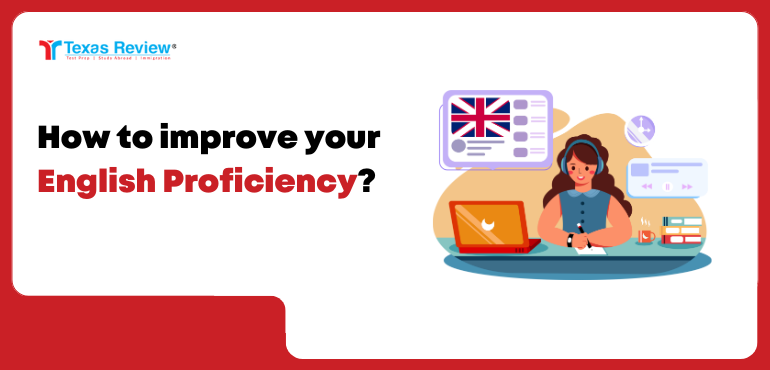
Learning English requires hard work, continuous practice, and patience. It may take years to become proficient, but it opens doors to better opportunities in education, jobs, and social connections.
While it is unfair to judge intelligence based solely on English fluency, it plays a significant role in academic success and career advancement. Mastery of the language involves four key skills: reading, writing, speaking, and listening.
Though many believe reading extensively is essential, it can be challenging due to busy schedules and short attention spans. With effective strategies and consistent practice, improvement is achievable. Preparing for exams like IELTS or TOEFL can also help.
Top 10 Best Methods to Improve Your English Proficiency
Here are the top 10 reasons why these methods are essential for mastering English, ensuring continuous improvement, and helping you achieve fluency in all aspects of the language.
Immerse Yourself in English
Immersion is a great method for language learning; use every available opportunity to engage with English. Surround yourself with the language in your daily life. Watch English movies, read English literature, listen to English songs, and speak English every day.
Find some buddy practice partners from your friends, relatives, or colleagues who are willing to do the same. Set a schedule for a regular English conversation. Identify your weaknesses, correct them actively, and find out immersion to think, speak, and absorb English regularly, which has proved to speed up learning.
Get Familiar with Distinct Accents
Another persona regarding English is worldwide, which is also spoken for varied accents-British, American, Australian, Canadian, and so forth. Understanding the accents indeed enhances one’s listening capacities and learning to speak with people from different regions.
Experimenting with diverse accents can be done by listening to podcasts, audiobooks, or even by tuning into an international news channel. Then try to copy them and see how their sounds will develop for example pronunciation and clarity.
Make a Habit of Reading Newspapers and Magazines
Reading is really important because it increases vocabulary, comprehension, and sentence structure. Newspapers, magazines, and articles expose very different styles, terminologies, and current affairs.
So develop good reading habits that will get you to read at least one article every day. Take those newspapers, magazines, and articles that appeal to your interests to make the experience enjoyable. It will surely broaden your knowledge and significantly improve your reading and writing skills.
Focus on Fluency, Not Grammar
It lacks some balance for being a good speaker because some grammar rules have to be taken seriously, but sometimes their overemphasis hinders fluent speaking. The right approach is speaking as naturally and comfortably as possible without thinking too hard about how to construct each sentence one should be uttering.
In speaking practice, you should prioritize speaking fluently, and don’t stop every few seconds to correct things that aren’t quite right grammatically. In time, fluency will become second nature, and grammar will improve with exposure to the language.
Practice Transcribing What You Hear
This transcription of audio exercises increasingly growing strong for perfecting the two skills of listening and writing. First, choose any audio that you think can be able to relate to your listening proficiency in the English language- a podcast, TED talk, or even a simple video on YouTube.
Listen carefully and transcribe what you hear. Compare your transcription with the original actual script. That improves listening and mimicking, including melody, rhythm, pronunciation, and word or phrase recognition.
Test and Correct Yourself
Self-assessment is a crucial part of language learning. Regularly test your reading, writing, speaking, and listening skills. Use online quizzes, mock exams, or language apps to evaluate your progress.
Additionally, ask a friend, tutor, or language partner to review your work. Constructive feedback helps identify mistakes and provides a path for improvement.
Improve Your Vocabulary
Vocabulary is the cornerstone of language competency. A rich vocabulary enables a person to convey their ideas more clearly and effectively.
Try learning a handful of new vocabulary words every day, follow their meanings, and practice using them in sentences. Flashcards and vocabulary apps are a great way to better improve vocabulary learning. In addition, familiarize yourself with some of the common phrases and idioms so that you can sound more natural in conversation.
Leverage Technology for Learning
Revolutionized, as they say, by technology in language learning. Using apps, learners read, speak, and listen interactively with an application like Duolingo, Rosetta Stone, or Babbel.
YouTube channels, online forums, and virtual language exchange programs also have their share of excellent resources. Energetic technology makes this learner able to practice anytime and anywhere.
Surround Yourself with English Speakers
The fastest technique to improve speaking skills is by conversing with native or fluent speakers of English. Look for online language groups, and visit workshops or forums that hold discussions.
If getting conversation partners becomes difficult, practice speaking to yourself in front of a mirror. Record yourself and listen to the playback so that you can improve on areas that need attention.
Practice Regularly
Mastering English means being consistent in your practice; you should fix a day when you have set aside a period every day to read a chapter, watch an English video, or just talk to someone for a short time.
Progress might seem slow at first, but it leads to daily practice, which fosters confidence and guarantees long-term development.
Conclusion
Improving your English proficiency requires time, patience, and dedication. The methods mentioned above are proven strategies that can help you become confident and fluent in English.
However, it’s essential to identify your specific goals—whether it’s improving speaking skills for better communication or preparing for an English proficiency exam. Focus on the areas that align with your objectives and tailor your practice accordingly.
Remember, learning a language is a journey, not a goal. Stay consistent, stay motivated, and success will come.














